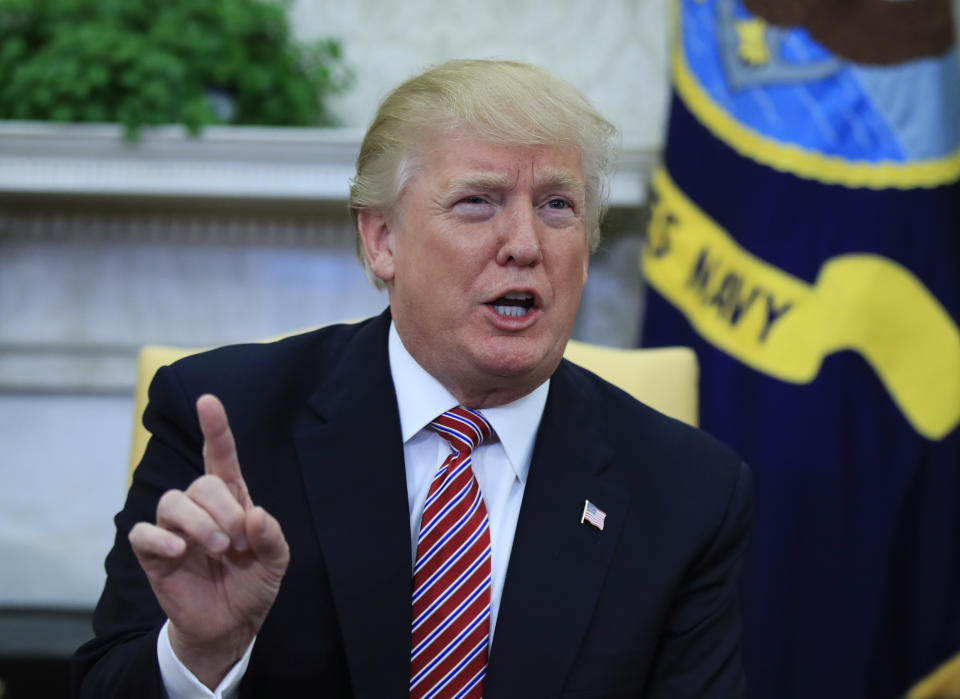Hiking the gas tax is crazy... for Republicans
Here’s a prediction for 2018: Congress is not going to raise the gas tax. No matter how hard President Donald Trump pushes for it.
And that’s too bad, because raising the gas tax would actually be smart.
Trump surprised the politisphere by endorsing the idea of raising the federal gas tax by 25 cents per gallon to pay for improvements to roads, bridges and other public projects. This came as Trump was touting his infrastructure program, which calls for $200 billion in new federal spending, but doesn’t identify where the money should come from. Trump didn’t call for hiking the gas tax publicly, but he backed the idea in a meeting with members of Congress to discuss his infrastructure plan. Meeting participants leaked it, naturally.
It’s a solid idea. No kidding. The gas tax, which helps finance the Highway Trust Fund, has been stuck at 18.4 cents per gallon since 1993, and it’s not indexed for inflation. So its value as a funding mechanism erodes steadily over time, which is why the Highway Trust Fund has been chronically short of funds lately. In 1993, the gas tax represented about 17% of the cost of a gallon of gas. Today, because of inflation, it’s less than 7%. If the gas tax were indexed for inflation, it would be around 46 cents per gallon, or 28 cents higher than it actually is, which would provide billions of needed dollars for road and bridge investment.

Economists like the gas tax as a funding tool, because it’s a user fee — the people who use the assets pay for them, in general. In other words, the more you drive and the more you use the nation’s roads, the more gas you buy and the more you pay in taxes to build and maintain those roads. That’s a lot better than using, say, sales or income taxes to pay for roads, since some people who pay those taxes don’t drive much.
Using gas taxes to fund infrastructure investment used to be a bipartisan idea. Presidents Ronald Reagan and George H. W. Bush both approved increases in the federal gas tax, as did President Bill Clinton, the last chief executive to do so. A trade group representing civil engineers calling for giant investments in infrastructure supports a higher gas tax. Many Democrats do too, and it’s an ideal time to do it — since gas is cheap and the economy is getting stronger. Many drivers would barely feel it.
But it’s not going to happen, because of something else Republicans did recently: cut income taxes for business and for the majority of individual taxpayers. The Tax Cuts and Jobs Act, which Trump signed at the end of 2017, will cut taxes by $1.5 trillion during the next 10 years, with businesses and wealthy individuals enjoying most of the windfall, according to both government analyses and private estimates.
The gas tax is a consumption tax, and most consumption taxes fall more heavily on lower earners than on higher earners. With gas prices around $2.75, where they are now, a driver logging 12,000 miles per year in a car that gets 25 miles per gallon would spend $1,320 per year on fuel. A 25-cent hike in the gas tax would boost that by $120 per year. For a family earning $250,000 or more, that’s probably inconsequential. For somebody earning $30,000, it’s a noticeable added expense.
Trump’s idea, borrowed from others, is to phase in a 25-cent hike in the gas tax over time — say five years. Perfectly reasonable. Except, we have elections. If the Republican-controlled Congress approved any hike in the gas tax this year, they’d have to explain to voters why they cut income taxes on businesses and high earners, yet raised the gas tax, which will hit low-income people with long commutes, contractors, and families with a bunch of kids to run around the hardest. Republicans are already facing electoral blowback in the 2018 midterms for Trump’s many controversies. There’s a 50-50 chance they could lose control of the House of Representatives, plus an outside chance they could lose control of the Senate. Raising the gas tax would help the Democrats more than 10 Stormy Danielses would.
An astute strategist might have thought of that while plotting the huge tax cuts for businesses and the wealthy that Trump signed in December. That deal doomed any tax hikes that don’t hit the wealthy first, most and hardest. Perhaps somebody should inform the president.
Confidential tip line: rickjnewman@yahoo.com. Encrypted communication available.
Rick Newman is the author of four books, including Rebounders: How Winners Pivot from Setback to Success. Follow him on Twitter: @rickjnewman
Follow Yahoo Finance on Facebook, Twitter, Instagram, and LinkedIn

